Record Attendance at National Meeting for International Coordinators
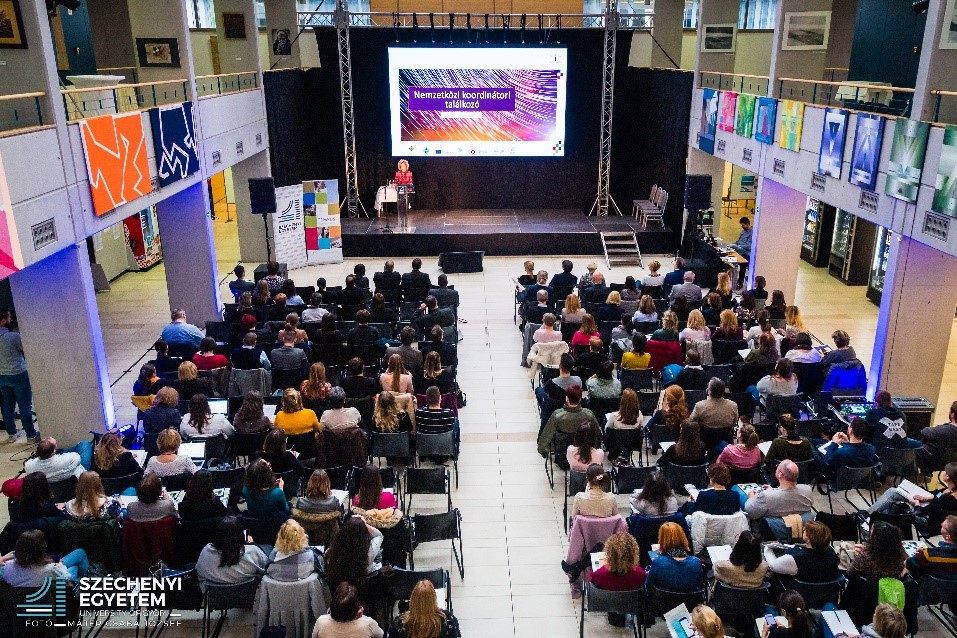 The internationalization of Hungarian higher education was at the centre of the National International Coordinators Meeting held at Széchenyi István University from Wednesday 27 November to Friday 29 November. Thanks to the Stipendium Hungaricum Scholarship Programme, The University of Győr is making great progress in its internationalization process. The Meeting was a record-breaking event, with nearly three hundred participants arriving from all Hungarian HEIs.
The internationalization of Hungarian higher education was at the centre of the National International Coordinators Meeting held at Széchenyi István University from Wednesday 27 November to Friday 29 November. Thanks to the Stipendium Hungaricum Scholarship Programme, The University of Győr is making great progress in its internationalization process. The Meeting was a record-breaking event, with nearly three hundred participants arriving from all Hungarian HEIs.
On Wednesday afternoon at the opening of the National Meeting for International Coordinators, organised jointly with the Tempus Public Foundation, the Aula of Széchenyi University was filled with delegates. The high level of interest was not a coincidence, as a record 260 internationalization staff from 41 affiliated institutions arrived for this complex and intensive professional training event.

The venue for the opening ceremony was the University Aula.
In her welcoming speech, Dr Eszter Lukács, Vice Rector for Educational Affairs, described how the process of internationalization at Széchenyi University had been preceded by a comprehensive curriculum reform and complex infrastructural development. Within this framework, with the support of both central government and local government, a 1,100 capacity Hall of Residence was built in 2017, today a world-class home for almost all international students. "We are convinced that to achieve a student-centered education and operation, it is essential to create an environment that is attractive to both Hungarian and international students," the deputy rector emphasized. As part of that process, she added, this year the Management Campus building was inaugurated, sports facilities have been expanded with a running track and basketball courts, with the beach volleyball court due to be completed next year on the banks of the River Moson-Danube. This infrastructural expansion will continue right until 2024 with the construction of a Science and Innovation Park to be located just 500 metres from the campus on the site of the former biscuit factory.
Dr Lukács explained that although Széchenyi University is relatively new in the field of internationalization, it has undergone significant development within the space of just a few years. While in academic year 2015/16 there were as yet only two English-taught academic programmes supported by the Stipendium Hungaricum (SH) Scheme, next academic year 2020/21, due to the opportunities offered by the new SH application cycle, there will be a choice of 21 available programmes for scholarship applicants from an overall total of 27 English-taught programmes. The Deputy Rector also talked about the need for Hungarian Higher Education to meet the two main national student mobility targets by 2023: to increase the number of international students in full-time education to 40,000, and to ensure that at least 20% of Hungarian students spend three months studying abroad. She did not conceal that the latter criterion posed a challenge to the HEIs, and it was with this in mind that the meeting's professional programme was drawn up.
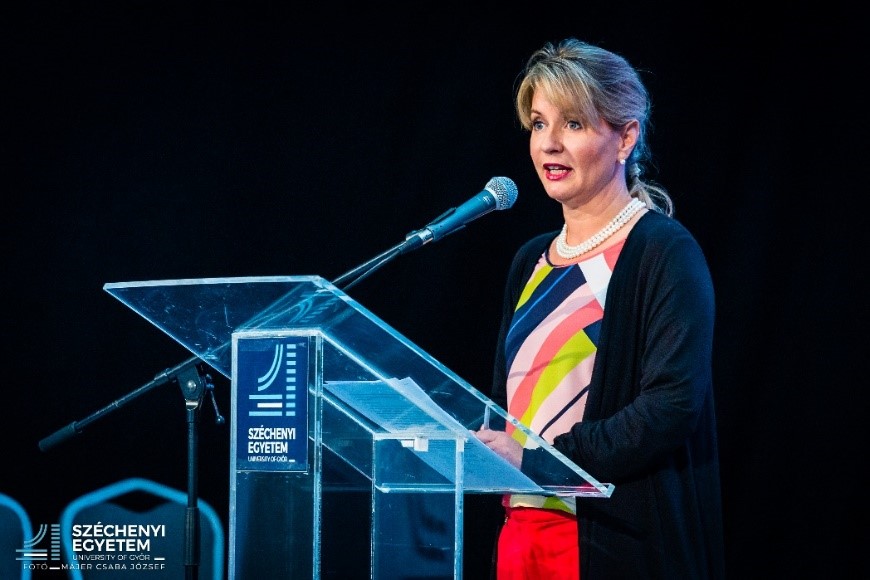
Dr Orsolya Pacsay-Tomassich, State Secretary at the Ministry of Foreign Affairs and Trade responsible for the Hungarian Diplomatic Academy and the Stipendium Hungaricum Programme.
At the opening, Dr Orsolya Pacsay-Tomassich, State Secretary at the Ministry of Foreign Affairs and Trade responsible for the Hungarian Diplomatic Academy and the Stipendium Hungaricum Programme, as a preliminary pont, stated that the University of Győr has become one of the most important centres of higher education in the country. She recalled that the Stipendium Hungaricum Programme was created by the government in 2013 as an important part of Hungary’s educational policy and for the purposes of international aid, as well as foreign economic and diplomatic relations. “We want our international students to return to their home countries with competitive knowledge and enabled to contribute to the development and growth of their country. We are building human capital that strengthens market access for Hungarian companies. Figures also support the way in which, in recent years, the programme has contributed to strengthening bilateral economic relations, ” she added. The State Secretary underlined that it is not often mentioned how much the programme contributes to our country in other ways. With the increasing number of English-taught programmes, more and more Hungarian students will have the opportunity to study and do research in a foreign language, which is an essential condition for our universities to advance in international higher education rankings.
According to the Secretary of State, the success of Stipendium Hungaricum is shown by the fact that at the outset, international students originating from only three countries came to Hungary via the scheme, and now that number is 69. As a new feature, she mentioned that the government would like to encourage international students to learn Hungarian, with the hope that they would later become little Hungarian ambassadors in their home countries. Dr Pacsay-Tomassich also spoke about the importance of the alumni movement: the goal is for returnees to volunteer to operate the network of students who have formerly studied in Hungary, and to do this, they must start the work while they are still here in Hungary.
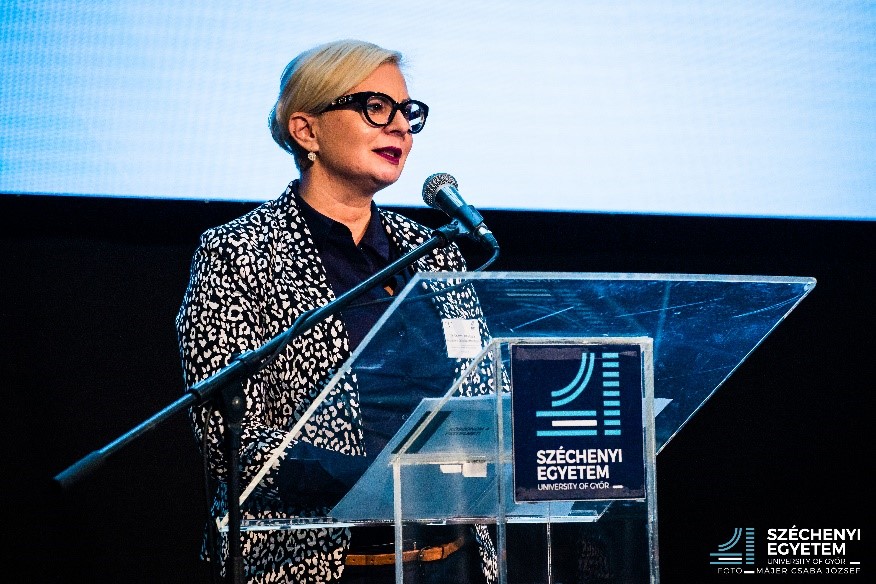
Dr Laura Sinóros-Szabó, Head of the Department for Higher Education Strategy and Institutional Development at the Ministry of Innovation and Technology.
Dr Laura Sinóros-Szabó, Head of the Department for Higher Education Strategy and Institutional Development at the Ministry of Innovation and Technology, in her speech, that the government's goal by 2020 is for the proportion of the 30-34 year age group with a university or college education should reach 34%, and that there was a good chance of this happening.
Mr Péter Tordai, Director of Tempus Public Foundation, defined the essence of the event as a dialogue between ministry representatives, HEIs and the public foundation.

Péter Tordai, Director of the Tempus Public Foundation.
During the three-day meeting, participants gained valuable insights from the 23 sections and numerous plenary presentations. One of the latter was delivered by Mr Nicolas Cletz, Regional Director at Times Higher Education (THE). The specialist presented the background to the higher education rankings prepared and published each year. The oldest of these rankings focuses on research performance, and at the last count nearly 1,400 institutions were featured. Results are based on indicators in five areas: educational environment, research, citation, industrial income and international orientation. Several years ago, THE introduced new lists, recognizing that research is not everything. One concerns the quality of education, the most important basis of which is a student survey, the other corresponds to the UN's 17 Sustainable Development Goals, which include for example eradicating poverty, gender equality, and tackling climate change. Mr Cletz pointed out that there is no miracle recipe for getting on any of the lists, "Analyze data regardless of ranking, compare it with others’ data, and determine what to do in the short and long term" - he advised, noting that THE takes note of feedback, even of sharp criticisms, and constantly improves its methods.
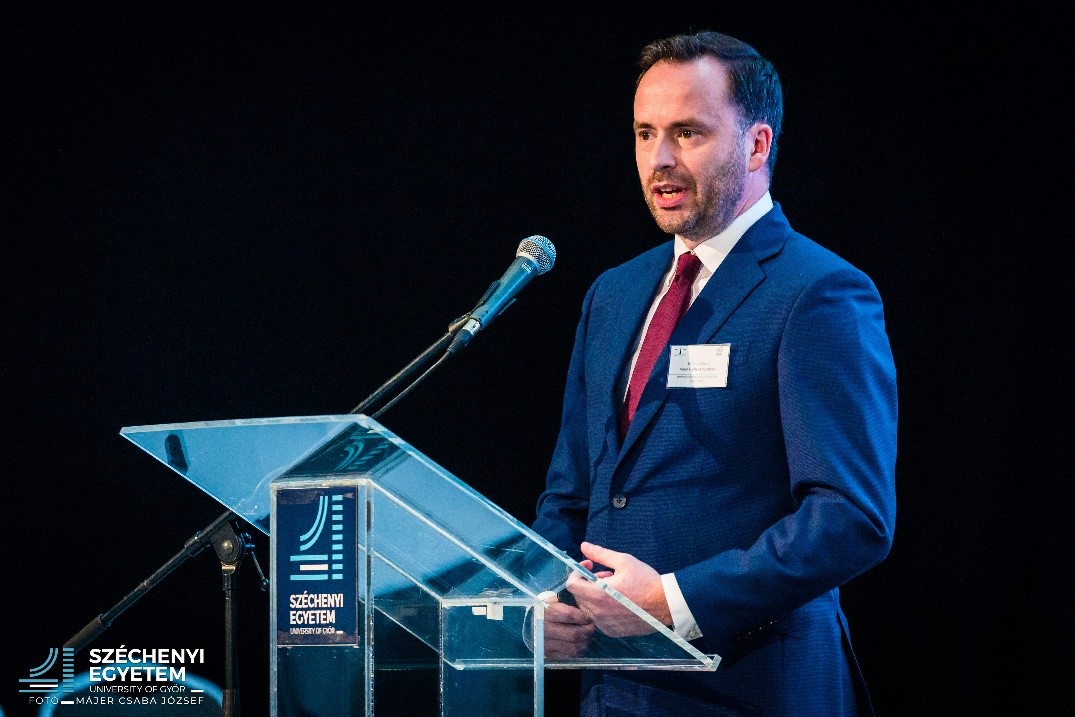
Nicolas Cletz, Regional Director at Times Higher Education (THE)
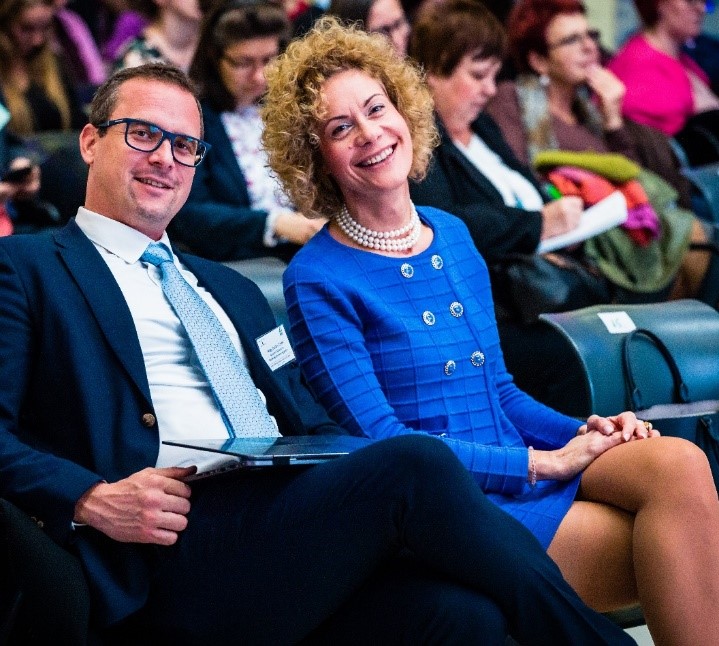
Dr Balázs Nagy, Vice-Rector for International Affairs at Budapest University of Technology and Economics together with Dr Eszter Lukács, Vice-Rector for Educational Affairs at Széchenyi István University, Győr
As part of the National International Coordinators Meeting, a gala dinner was held at the former synagogue, where awards from the Tempus Public Foundation were presented. Acknowledgments went to Gabriella Balog-Molnár (University of Szeged), Réka Tóth-Dolenszky (Károly Eszterházy University), Dr Zsuzsanna Tarr (Szent István University), Katalin F. Tóth (Semmelweis University), Csilla Kánai (Szent István University), Krisztina Sándor (University of Miskolc), Dr Edit Tanács (University of Szeged), Márta Sándor (University of Sopron) and a representative of Eötvös Loránd University Erasmus + and International Programmes Department.
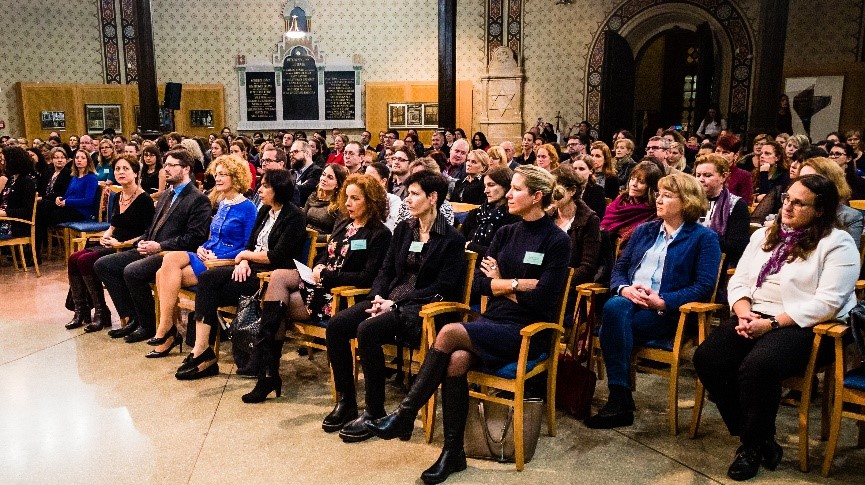
Participants of the meeting attending the award ceremony filled with the former synagogue.
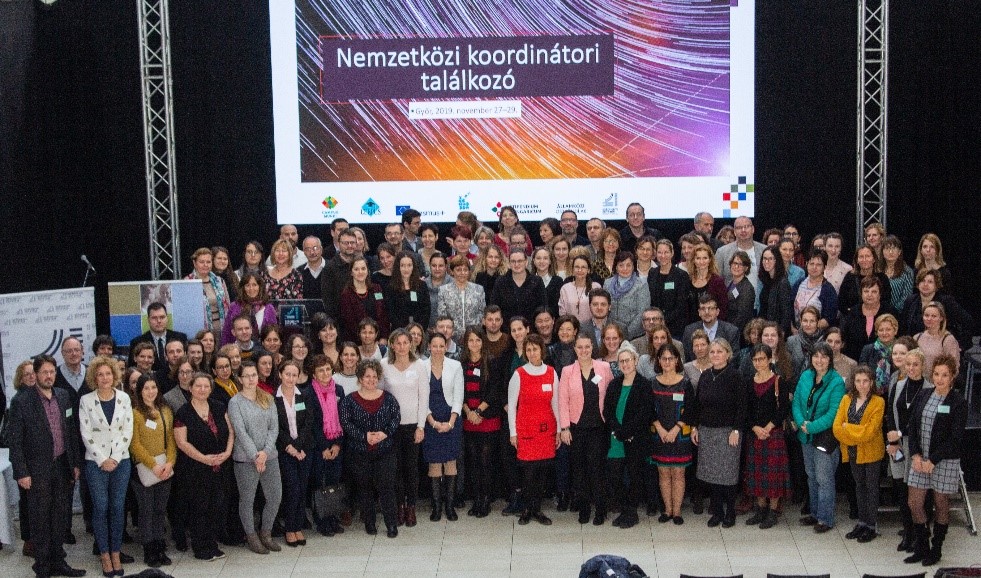 Group photo following Friday's plenary session
Group photo following Friday's plenary session











